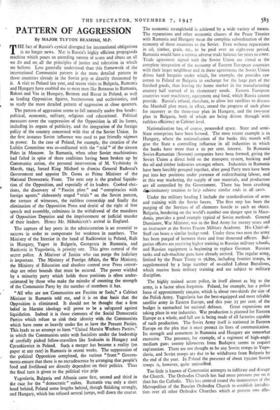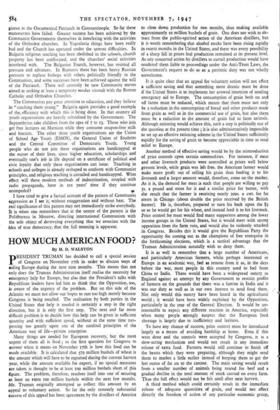PATTERN OF AGGRESSION
By MAJOR TUFTON BEAMISH, M.P.
THE fact of Russia's cynical disregard for international obligations is no longer news. Nor is Russia's highly efficient propaganda machine which pours an unending torrent of scorn and abuse on all we do and on all the principles of justice and toleration in which we believe. Less generally understood than this framework of the international Communist pattern is the more detailed pattern in those countries already in the Soviet grip or directly threatened by it. A visit to Poland last year, and recent visits to Bulgaria, Rumania and Hungary have enabled me to meet men like Botnaras in Rumania, Rakosi and Vas in Hungary, Berman and Bierut in Poland, as well as leading Opposition figures, businessmen and ecclesiastics, and
• to study the more detailed pattern of aggression at close quarters.
The pattern of aggression seems to fall naturally under five heads : political, economic, military, religious and educational. Political measures cover the suppression of the Opposition in all its forms, including its organs of publicity, and the integration of the foreign policy of the country concerned with that of the Soviet Union. In the first instance Soviet influence was used to put friendly regimes in power. In the case of Poland, for example, the creation of the Lublin Committee was co-ordinated with the " trial " of the sixteen Poles in Moscow. In Rumania, when other Soviet machinations had failed in spite of three coalitions having been broken up by Communist action, the personal intervention of M. Vyshinsky in March, 1945, forced King Michael to dismiss General Radescu's Government and appoint Dr. Groza as Prime Minister of the National Democratic Front. The next step is the gradual liquida- tion of the Opposition, and especially of its leaders. Cooked elec- tions, the discovery of " Fascist plots " and " conspiracies with foreign agents," elaborately staged " trials " on the Soviet pattern, the torture of witnesses, the ruthless censorship and finally the elimination of the Opposition Press and denial of the right of free speech and assembly, culminate in the withdrawal of the mandates of Opposition Deputies and the imprisonment or judicial murder of their leaders. Hence Mr. Mikolajczyk's arrival in England.
The capture of key posts in the administration is an essential to success in order to compensate for weakness in numbers. The Ministry of the Interior in the hand of Radkiewicz in Poland, Rajk in Hungary, Yugov in Bulgaria, Georgescu in Rumania, and Rankovic in Yugoslavia, is priority one. This gives control of the secret police. A Minister of Justice who can purge the judiciary is important. The Ministry of Foreign Affairs, the War Ministry, the Ministry of Education and absolute control over Press censor- ship are other bounds that must be secured. The power wielded by a minority party which holds these positions is often under- estimated by those who make the mistake of counting the strength of the Communist Party by the number of members it has.
"All who are not Communists are Fascists or fools," a Cabinet Minister in Rumania told me, and it is on that basis that the Opposition is eliminated. It should not be thought that a firm belief in Marxist ideology will prove to be a safeguard against liquidation. Indeed it is those elements of the Social Democratic Parties which refuse to sink their identity with the Communists which have come as heavily under fire as have the Peasant Parties. This leads to an attempt to form " United Marxist Workers Parties," in which the Communists unite with Socialists under the leadership of carefully picked fellow-travellers like Szakasits in Hungary and Cyrankiewicz in Poland. Such a merger has become a reality (on paper at any rate) in Rumania in recent weeks. The suppression of the political Opposition completed, the various "front" Govern- ments ensure that there is no recrudescence by arranging that people's food and livelihood are directly dependent on their politics. Thus the final turn is given to the political vice grip.
Yugoslavia, Bulgaria and Albania came first, second and third in the race for the " democratic " stakes. Rumania was only a short head behind, Poland some lengths behind, though finishing' strongly, and Hungary, which has refused several jumps, well down the course.
The economic stranglehold is achieved by a wide variety of means. The reparations and other economic clauses of the Peace Treaties with Rumania and Hungary mean the complete subordination of the economy of those countries to the Soviet. Even without reparations in oil, timber, grain, etc., to be paid over an eight-year period, Rumania would have a serious adverse trade balance for years to come. Trade agreement signed with the Soviet Union are a;med at the complete integration of the economy of Eastern European countries with their larger neighbour and in these agreements the Soviet Union drives hard bargains under which, for example, she provides raw cotton to Poland or Bulgaria in exchange for the large part of the finished goods, thus leaving the home market in the manufacturing country half starved of its elementary needs. Eastern European countries want machinery, equipment and food, which Russia cannot provide. Russia's refusal, therefore, to allow her satellites to discuss the Marshall plan must, in effect, retard the progress of such plans for recovery as the three-year plan in Hungary, and the two-year plan in Bulgaria, both of which are being driven through with ruthless efficiency at Cabinet level.
Nationalisation has, of course, proceeded apace. State and semi- State enterprises have been formed. The most recent example is in Hungary, where the nationalisation of the banks this month will give the State a controlling influence in all industries in which the banks have more than a 20 per cent. interest. In Rumania Soviet-Rumanian (Sovrom) companies have been formed, giving the Soviet Union a direct hold on the transport system, banking and the oil and timber industries amongst others. Industries in Rumania have been forcibly grouped together, after good Party men have been put into key positions under pretence of redistributing labour, and in this way marketing, the supply of raw materials, and production are all controlled by the Government. There has been crushing discriminatory taxation to he:p achieve similar ends in all cases.
Under the military heading I include the standardisation of arms and training with the Soviet forces. The first step has been the purging of the Services of all elements hostile to such an object. Bulgaria, bordering on the world's number one danger spot in Mace- donia, provides a good example typical of Soviet methods. General Damianov, War Minister, was in the Red Army for twenty years and an instructor at the Soviet Frunze Military Academy. His Chief-of- Staff can boast a similar background. Under these two men the army has been purged of between three and four thousand officers. Bul- garian officers are receiving higher training in Russian military schools, and Russian equipment is beginning to replace German. Russian tanks and sub-machine guns have already arrived. The regular army, limited by the Peace Treaty to 56,80o, including frontier troops, is supplemented by a large number of so-called Labour Battalions, which receive basic military training and are subject to military discipline.
The highly trained secret police, in itself almost as big as the army, is a factor often forgotten. Poland, for example, has a police force of approximately too,000, which is about two-thirds the size of the Polish Army. Yugoslavia has the best-equipped and most reliable satellite army in Eastern Europe, and this year, 23 per cent. of the budget is earmarked for national defence. Great expansions are taking place in war industries. War production is planned for Eastern Europe as a whole, and full use is being made of all factories capable of such production. The Soviet Army itself is stationed in Eastern Europe on the plea that it must protect its lines of communication. Its strength and armament in Rumania and Hungary are somewhat excessive. The presence, for example, of a regiment of high-angle medium guns twenty kilometres from Budapest seems to require explanation. There are not thought to be any Soviet troops in Yugo- slavia, and Soviet troops are due to be withdrawn from Bulgaria by the end of the year. In Poland the presence of about 150,000 Soviet troops is, however, quite unjustified.
Too little is known of Communist attempts to infiltrate and disrupt the Church. The Orthodox Church has had more pressure put on it than has the Catholic. This has centred round the manoeuvres of the Metropolitan of the Russian Orthodox Church to establish jurisdic- tion over all other Orthodox Churches which at present owe alle- giance to the Oecumenical Patriarch in Constantinople. So far these manoeuvres have failed. Greater success has been achieved by the Communist Governments themselves in interfering with the activities of the Orthodox churches. In Yugoslavia things have been really bad and the Church has operated under the utmost difficulties. In Bulgaria religious teaching has been abolished in the schools, church property has been confiscated, and the churches' social activities interfered with. The Bulgarian Exarch, however, has resisted all pressure and advances. In Rumania there has been heavy Russian pressure to replace bishops with others politically friendly to the Communists, and some successes have been achieved against the will of the Patriarch. There will certainly be new Communist moves aimed at seeking at least a temporary modus z,ivendi with the Roman Catholic and Orthodox Churches.
The Communists pay great attention to education, and they believe in " catching them young." Bulgaria again provides a good example of the, efficiency with which this is being done. In that country all youth organisations are heavily subsidised by the Government. The Septembrists take children from the ages of 7 to 13. Those who join get free lectures on Marxism while they consume coupon-free milk and biscuits. The other three youth organisations are the Union of School Age Youth (EMOS), the General Union of Students and the Central Committee of Democratic Youth. Young people who do not join these organisations are handicapped at the outset of their lives, since higher education, scholarships and eventually one's job in life depend on a certificate of political and civic loyalty that only these organisations can issue. Teaching in schools and colleges is already reshaped to conform with Communist principles, and religious teaching is curtailed and handicapped. What effect will these modern methods of indoctrination, coupled with radio propaganda, have in ten years' time if they continue
unimpeded? •
I have tried to give a factual account of the pattern of Communist aggression as I see it, without exaggeration and without heat. The real significance of this pattern may not immediately strike everybody. It is when one remembers that at the centre of the pattern is the Politbureau in Moscow, directing international Communism with the sole object of destroying everything that we associate with the idea of true democracy, that the full meaning is apparent.



































 Previous page
Previous page